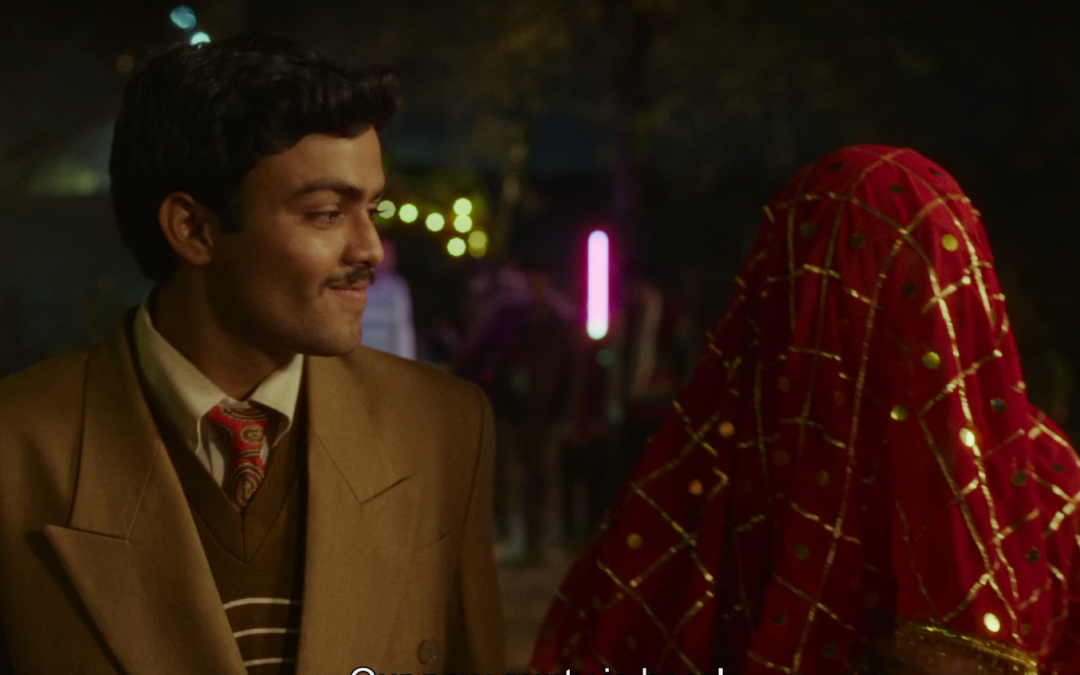Synopsis:
During a train journey, the lives of two young brides, Phool Kumari (played by Nitanshi Goel) and Pushpa (portrayed by Pratibha Ratna), take an unexpected turn when they are accidentally swapped. This mix-up sets off a chain of events filled with turmoil. Matters worsen when Deepak Kumar (played by Sparsh Shrivastav), Phool’s hapless husband, seeks the dubious help of corrupt police officer Shyam Manohar (played by Ravi Kishan).
Rao’s film doesn’t shy away from its feminist essence. It cleverly weaves its narrative with sharp observations on societal truths, still relevant in the film’s setting of 2001. Set against the backdrop of an era marked by early cell phones and slow train journeys, the film paints a vivid picture of its time. Amidst its feminist undertones, the film pulsates with raw emotion. It doesn’t hesitate to confront harsh realities. In the end, amidst the chaos, illusions are shattered, and true identities and self-worth are unearthed.

Review:
In “Iran Rao’s” portrayal, Biplab Goswami delves into the intricate layers of patriarchy’s grip on young girls’ aspirations, employing a blend of wit, irony, and a touch of foreboding. Rao deftly wields the ghoonghat, a traditional symbol, as a tool of both concealment and revelation in her narrative.
The story revolves around the newlyweds Phool Kumari (played by Goel) and Jaya (portrayed by Ranta), their faces veiled behind crimson chris, facing daunting challenges. While both Phool and Jaya yearn for happiness, their paths diverge significantly. Kiran’s directorial vision is meticulously executed, evident in every aspect of the film, from the evocative soundtrack to the meticulous scene compositions.
The ensemble cast, predominantly composed of emerging talents, serves the narrative well, ensuring that the storyline remains the focal point without being overshadowed by established stars. Aamir Khan’s portrayal of the groom is fitting, considering his dual role as both actor and producer. While Ravi Kishan delivers a commendable performance as the righteous cop, the character’s transformation seems somewhat overstated, stretching the bounds of believability.
Overall, “Iran Rao’s” film earns a respectable 2.5 stars out of 5, offering a thought-provoking exploration of societal norms and individual aspirations amidst patriarchal constraints.

Furthermore, there’s a palpable need for Geeta Agarwal to break free from her typecast role as the quintessential Bollywood mother. Conversely, Goel’s portrayal exudes a delicate charm, while Ranta, though more mature, portrays a character struggling to assert her independence, ultimately stealing the spotlight. These two contrasting portrayals represent different facets of resilience amidst adversity.
The film’s progressive stance, addressing both gender dynamics and societal norms, elevates its significance beyond mere entertainment value. It resonates with audiences on a deeper level, leaving a lasting impression. By tastefully integrating elements of rural life, the film imparts meaningful messages without resorting to heavy-handed tactics. It’s a cinematic experience that you’ll carry home with you.
For its nuanced storytelling and thematic depth, this film merits a rating of 2.5 out of 5 stars, offering a compelling exploration of resilience and empowerment.


